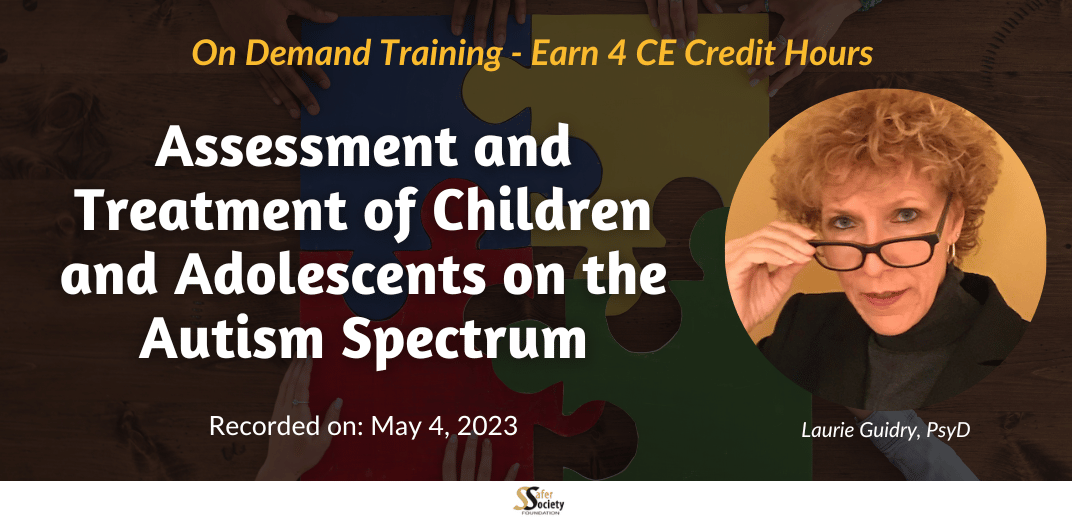
Assessment and Treatment of Children and Adolescents on the Autism Spectrum
Already purchased an On Demand training?
Click here to access your Safer Society On-Demand Training Center account.
Conducting psychosexual assessment and treatment with children and adolescents who have autism spectrum disorders (ASD) can present unique challenges for clinicians. The field has evolved significantly over the past two decades, with substantial advancements in research and evidence-based practices.
This training, presented by Laurie Guidry, PsyD, covers essential topics for professionals working with this population.
Key Areas of Focus
- Diagnostic Considerations
- Current diagnostic criteria for ASD
- Biopsychosocial and neuroanatomical factors
- Assessment Approaches
- Functional behavioral analysis techniques
- Paraphilia versus counterfeit deviance
- Treatment Considerations
- Qualities of adults who are successful with ASD clients
- Addressing commonly reported problematic sexual behaviors
- Ethical and Communication Practices
- Person-first language versus identity-first language
- Appropriate terminology and labeling
This training helps professionals develop a deeper understanding of autism among children and adolescents as a multi-faceted, brain-based disorder and provides guidance on current best practices in ASD psychosexual assessment and treatment.
1) Describe how children and adolescents on the autism spectrum perceive the complex socio-sexual environment they live in.
2) Identify the key elements of a comprehensive, best-practice psychosexual risk assessment for neuroatypical children and adolescents who have engaged in problematic sexual behaviors.
3) Implement treatment options for neuroatypical children, youth, and adolescents.
4) Explain the differences between emerging paraphiliac and “counterfeit deviance.”
5) Describe developmental insults that lead to problematic sexual behaviors in children and adolescents.
Audience
This training is for individuals who work with young people diagnosed with ASD. This includes psychologists, social workers, healthcare providers, and other mental health clinicians.
Content Level
Disclosure
Continuing Education Approval
American Psychological Association (APA)
Safer Society Foundation, Inc. is approved by the American Psychological Association (APA) to sponsor continuing education for psychologists. Safer Society Foundation, Inc. maintains responsibility for this program and its content.
Who's Presenting

Laurie Guidry, PsyD
Dr. Guidry is a licensed clinical and forensic psychologist practicing across the New England region and specializing in the effective assessment, treatment, and risk management of individuals who perpetrate sexual violence, engage in problematic sexual behaviors and in the prevention and elimination of sexual violence. Dr. Guidry has expertise in working with sexual offenders/abusers who present with co-morbid psychiatric conditions, neurodevelopmental and intellectual developmental disorders, and histories of trauma. Dr. Guidry is the Past President of the Massachusetts Association for the Treatment of Sexual Abusers (MATSA), serving in that role for 10 years. She is published in the field and is active in efforts to inform public policy on rational, evidence-based, and comprehensive approaches to maximizing public safety through the effective treatment and management of sex offenders. In 2017, she was honored by MATSA/MASOC with a career service award in recognition of her work to end sexual abuse and sexual violence.
